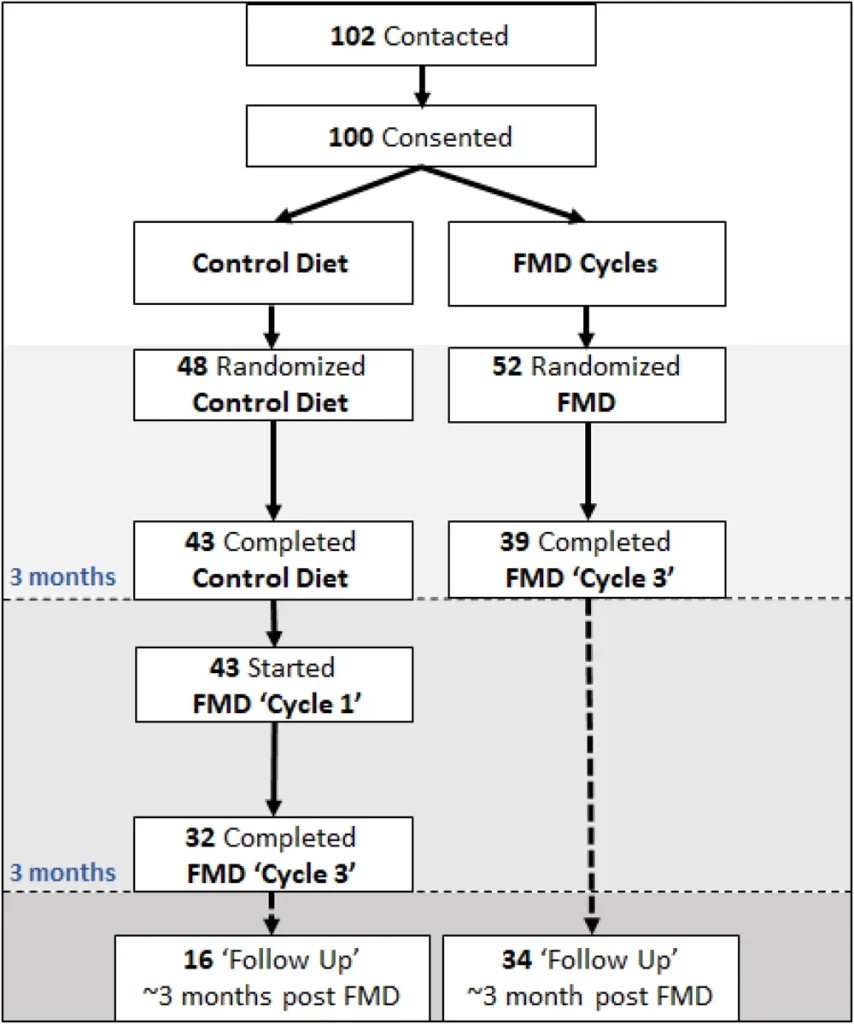Turn Back the Clock: Fasting Rejuvenate Cells
Support cell health and reduce disease risk? Discover how fasting-mimicking cycles may lower biological age!

Cycles of a diet that mimics fasting have been linked to reductions in signs of immune system aging, insulin resistance, and liver fat in humans—factors associated with a lower biological age, as shown in a recent study led by the USC Leonard Davis School of Gerontology.
Published in Nature Communications, the research adds to growing scientific support for the fasting-mimicking diet (FMD). This 5-day approach emphasizes unsaturated fats while remaining low in calories, protein, and carbohydrates. Designed to imitate the physiological effects of a water-only fast, it provides essential nutrients, increasing the likelihood of completion without extreme restriction.
According to the study’s senior author,
“This study shows for the first time evidence for biological age reduction from two different clinical trials, accompanied by evidence of rejuvenation of metabolic and immune function.”
Earlier investigations by the same research team had already connected FMD cycles to various health benefits. These include enhanced stem cell regeneration, mitigation of chemotherapy-related effects, and a reduction in dementia markers in animal models. In human subjects, lower risk factors for conditions such as cancer, diabetes, and cardiovascular disease have also been observed. Prior findings indicated improved healthspan and lifespan in mice after one or two monthly FMD cycles. Until now, however, effects on biological age, liver fat, and immune aging in humans had not been clearly demonstrated.

Lower disease risks and more youthful cells
The effects of a fasting-mimicking diet (FMD) were examined in two clinical trial groups made up of individuals aged 18 to 70. Participants assigned to the FMD group followed 3 to 4 monthly cycles, each involving 5 days of the FMD followed by 25 days of a regular diet. The FMD included plant-based soups, energy bars, drinks, snacks, tea, and a supplement rich in essential nutrients such as vitamins, minerals, and fatty acids. Control groups maintained either a typical or Mediterranean-style diet.
Blood analysis from the trials revealed improved health markers among those on the FMD. Lower insulin resistance and HbA1c levels indicated reduced risk for diabetes. Imaging showed declines in abdominal and liver fat—key factors linked to metabolic syndrome. Additionally, an increase in the lymphoid-to-myeloid ratio was observed, suggesting enhanced immune function more consistent with a youthful profile.
Further analysis demonstrated a notable decrease in biological age—by an average of 2.5 years. This measure reflects cellular and tissue function rather than the number of years lived.
“This is the first study to show that a food-based intervention that does not require chronic dietary or other lifestyle changes can make people biologically younger, based on both changes in risk factors for aging and disease and on a validated method developed by the Levine group to assess biological age.”
Led by Sebastian Brandhorst, USC Leonard Davis research associate professor, and Morgan E. Levine, founding principal investigator at Altos Labs, the research adds to growing evidence supporting the FMD as a practical and periodic approach. Its design allows for reduced disease risk and improved health without major long-term dietary commitments.
Although already in use by many healthcare providers in the U.S. and Europe, these findings may prompt broader consideration of FMD cycles, particularly among those aiming to support healthy function and cellular youth.
https://doi.org/10.1038/s41467-024-45260-9
Study Summary
In animal models, periodic fasting-mimicking diet (FMD) cycles have been shown to protect healthy cells, eliminate damaged or abnormal cells—including cancerous and autoimmune types—reduce inflammation, support regeneration across systems, and promote longer lifespan.
In a secondary analysis of blood samples from a randomized clinical trial (NCT02158897), three cycles of FMD were associated with lowered insulin resistance and other markers linked to pre-diabetes, reduced liver fat as observed through magnetic resonance imaging, and an improved lymphoid-to-myeloid ratio, an indicator of a younger immune profile. A validated measurement of biological age, known to predict disease risk and mortality, showed a median reduction of 2.5 years in biological age after three FMD cycles. This effect occurred independently of weight loss.
A second clinical trial (NCT04150159) produced nearly identical outcomes. Together, these findings offer early evidence that FMD cycles may support reductions in key cardiometabolic risk factors and promote markers of biological youth.
